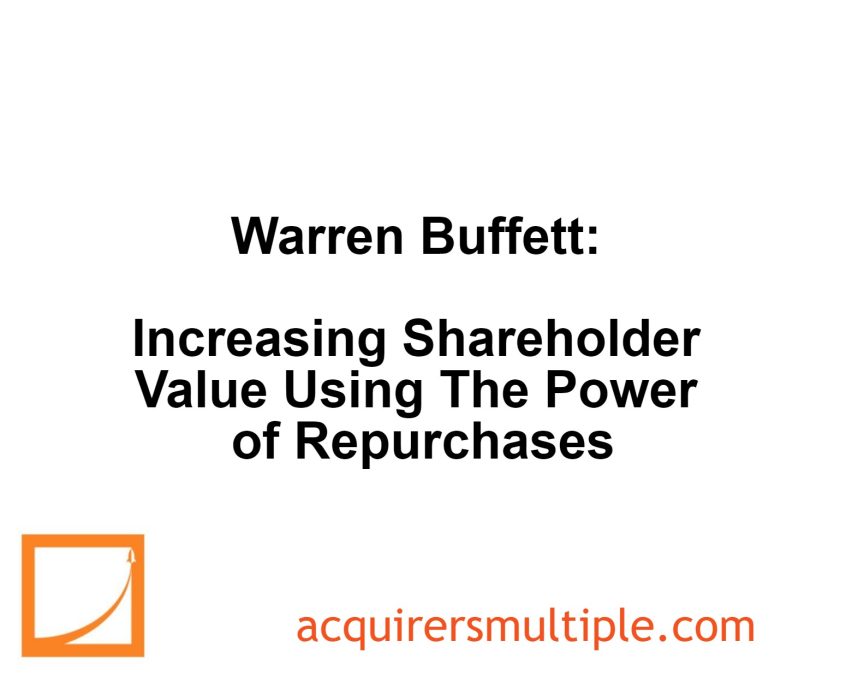In his 2020 Berkshire Hathaway Annual Letter, Warren Buffett discussed increasing shareholder value by using the power of repurchases. Buffett explained how the previous year Berkshire Hathaway repurchased 80,998 “A” shares for $24.7 billion, increasing shareholders’ ownership by 5.2% without additional investment.
Warren Buffett and Charlie Munger made these repurchases to enhance intrinsic value per share, only buying when prices were favorable. Buffett criticizes American CEOs for repurchasing shares at high prices.
Berkshire’s investment in Apple illustrates the power of repurchases; at that stage they owned 5.4% of Apple, up from 5.2%, due to Apple’s share buybacks. Consequently, Berkshire shareholders indirectly owned 10% more of Apple than in 2018. Repurchases, though gradual, effectively increase ownership in exceptional businesses over time.
Here’s an excerpt from the letter:
Last year we demonstrated our enthusiasm for Berkshire’s spread of properties by repurchasing the equivalent of 80,998 “A” shares, spending $24.7 billion in the process. That action increased your ownership in all of Berkshire’s businesses by 5.2% without requiring you to so much as touch your wallet.
Following criteria Charlie and I have long recommended, we made those purchases because we believed they would both enhance the intrinsic value per share for continuing shareholders and would leave Berkshire with more than ample funds for any opportunities or problems it might encounter.
In no way do we think that Berkshire shares should be repurchased at simply any price. I emphasize that point because American CEOs have an embarrassing record of devoting more company funds to repurchases when prices have risen than when they have tanked. Our approach is exactly the reverse.
Berkshire’s investment in Apple vividly illustrates the power of repurchases. We began buying Apple stock late in 2016 and by early July 2018, owned slightly more than one billion Apple shares (split-adjusted). Saying that, I’m referencing the investment held in Berkshire’s general account and am excluding a very small and separately-managed holding of Apple shares that was subsequently sold. When we finished our purchases in mid-2018, Berkshire’s general account owned 5.2% of Apple.
Our cost for that stake was $36 billion. Since then, we have both enjoyed regular dividends, averaging about $775 million annually, and have also — in 2020 — pocketed an additional $11 billion by selling a small portion of our position.
Despite that sale — voila! — Berkshire now owns 5.4% of Apple. That increase was costless to us, coming about because Apple has continuously repurchased its shares, thereby substantially shrinking the number it now has outstanding.
But that’s far from all of the good news. Because we also repurchased Berkshire shares during the 2½ years, you now indirectly own a full 10% more of Apple’s assets and future earnings than you did in July 2018.
This agreeable dynamic continues. Berkshire has repurchased more shares since yearend and is likely to further reduce its share count in the future. Apple has publicly stated an intention to repurchase its shares as well. As these reductions occur, Berkshire shareholders will not only own a greater interest in our insurance group and in BNSF and BHE, but will also find their indirect ownership of Apple increasing as well.
The math of repurchases grinds away slowly, but can be powerful over time. The process offers a simple way for investors to own an ever-expanding portion of exceptional businesses.
And as a sultry Mae West assured us: “Too much of a good thing can be . . . wonderful.”
You can read the entire letter here:
2020 Berkshire Hathaway Annual Letter
For all the latest news and podcasts, join our free newsletter here.
Don’t forget to check out our FREE Large Cap 1000 – Stock Screener, here at The Acquirer’s Multiple:



